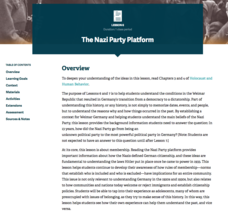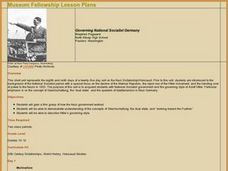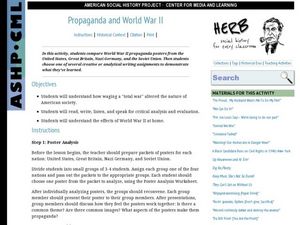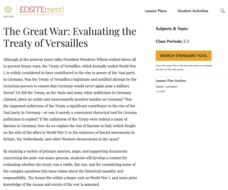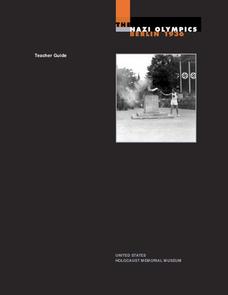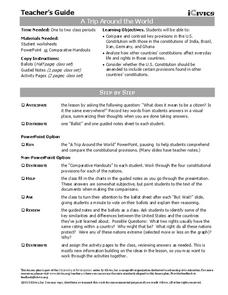Facing History and Ourselves
The Nazi Party Platform
Not all party platforms stay democratic. A resource covers many political issues in Germany during the time of World War II, and teaches pupils about the Nazi party platform and what went wrong. Individuals participate in a warm-up...
Curated OER
Art in Nazi Germany When Art and Politics Didn't Agree
Five lessons display the art created by Germans under the Weimar Republic. The focus of these lessons is to help learners understand the role of art in politics, government censorship, and Nazi tactics. Web links are included.
Curated OER
Governing National Socialist Germany
Students spend a month discovering the role of the Nazi Dictatorship during the Holocaust. Using the internet, they research the history of the Nazi party and the decline of the Weimar Republic. They examine how Hitler rose to power...
Curated OER
Propaganda and World War II
What was the true meaning behind WWII propaganda posters? Historians analyze images from the U.S., Great Britain, Nazi Germany, and the Soviet Union, sharing findings in small groups. A poster analysis worksheet and all posters are...
Curated OER
The 1848 Revolution, the Second Reich, and the First World War
Students explore the events that led up to World War I. In this World History lesson, students read an article on Germany and World War I, then answer four study questions and write an essay about the article.
Curated OER
ESL/EFL Lesson Plan - Nuclear Power Plants
Students participate in ESL/EFL activities as they read an article about nuclear power plants. In this ESL/EFL lesson, students read an article entitled, "Germany To Close All Nuclear Power Plants." They work on building vocabulary,...
Curated OER
The Great War: Evaluating the Treaty of Versailles
Young scholars examine and evaluate the Treaty of Versailles. They read and discuss primary source documents, explore various websites, develop a list of postwar goals for France, Germany, and the U.S., and evaluate whether the treaty...
Curated OER
Pre WWII Germany - Inflation
Eleventh graders differentiate between inflation and hyperinflation. They explain the economic conditions in Germany before WWII and the roles of government in a market economy. They analyze the importance of keeping inflation under...
Curated OER
Die Weisse Rose: German History
Young scholars conduct research on a German anti-Nazi group named "Die Weisse Rose", the White Rose, that eventually lost their lives for their resistance to Nazi rule. They view films, access the Internet, prepare responsive narratives...
The Formation of the Western Alliance, 1948–1949
Silence is golden—even when debating post World War II foreign policy. Using a silent debate format, young historians deliberate whether the United States should have kept a foothold in West Germany after World War II. A series of videos...
Curated OER
Deutschland und die Europäische Union (Germany and the European Union)
Introduce your language students in German class to the European Union, including the historic developments, the current structure, and some of the political and social principles behind it with this activity. In small groups, learners...
Curated OER
Remembering to Never Forget
Young scholars discover how the history of a place or event affects one's present perceptions of that place or event. They examine the current tensions caused by the decision to make Weimar, Germany Europe's cultural capital.
Curated OER
We Are the Champions
Can international sports events be indicative of a country's national pride? Learners consider how the Germany-hosted 2006 World Cup contributed to German cultural pride, and how the fundamentals of sports is celebrated around the world,...
Curated OER
"When They Came for Me, There Was No One Left to Speak Up" - Exploring Personal and Collective Responsibility in WWII
Students examine the underlying meaning of the phrase spoken by Pastor Martin Niemoller in 1945, "When they came for me, there was no one left to speak up." In this World History lesson, students share in a class discussion on civic and...
University of Southern California
Persecution of the German-Jews: The Early Years - 1933-1939
Young historians learn about the dehumanization process of stripping German Jews of basic, fundamental rights prior to the genocide of European Jews in the 1940s. Learners watch video clips of survivors who recount such events as the...
Curated OER
Political Asylum Talk Show
Learners view videos, visit websites, and read about the nature and changes made to the idea of political asylum. Beginning with Jewish refugees fleeing Nazi Germany, they will explore policy change throughout the years. The lesson...
Curated OER
Teaching the Holocaust Through Poetry
W.H. Auden’s poem “Refugee Blues” launches a study of the problems of refugees. Background information about the poem and general information about Jewish refugees from Germany and Austria are provided, as are discussion questions and...
US Holocaust Museum
Nazi Olympics: Berlin 1936
The Olympics are about more than sports—at times, the games are also a place of racism and prejudice! Pupils investigate the 1936 Olympics in Berlin, Germany. They analyze the meaning behind the materials included in the United States...
iCivics
A Trip Around the World
How do the rights of citizens in other countries, such as India, Germany, Brazil, and Iran, compare to those of Americans? Take a closer look at the provisions of various foreign constitutions, and compare and contrast the protections...
National Endowment for the Humanities
The Strategy of Containment, 1947–1948
How do people stop the spread of an ideology they don't think is right? Scholars research the policy of containment during the start of the Cold War. Small groups analyze primary sources to determine how the United States combated...
Facing History and Ourselves
Life for German Youth in the 1930s: Education, Propaganda, Conformity, and Obedience
The German youth faced an onslaught of propaganda when they went to school, thanks to the Nazi regime led by Hitler during World War II. Pupils relate their education experiences to German youth by analyzing primary source readings,...
Curated OER
Diaries And Memoirs
Students analyze how personal diaries and memoirs record actual events. They compare and contrast diaries and memoirs from the Holocaust. They engage in journal or diary writing as a way to explore one's own feelings and self.
Facing History and Ourselves
The Weimar Republic: Historical Context and Decision Making
Did you know that way before Hitler became a dictator, he actually spent nine months in a German jail? Provide the background for the escalating point before the Nazi party took over in World War II through the exercises in the resource....
Facing History and Ourselves
Laws and the National Community
When it comes to the law, is justice always served? Teach scholars about how law sometimes enables prejudice of entire groups of people with a unit on World War II that includes a warm-up activity, analysis of primary sources,...
Other popular searches
- Germany Geography
- Nazi Germany
- Christmas in Germany
- Great Depression Germany
- Unification of Germany
- Germany Geography Worksheets
- Germany Geography New
- Germany Geography Directions
- Rise of Nazi Germany
- Germany Geography Map
- Germany Geography Pictures
- Student Resources Germany


